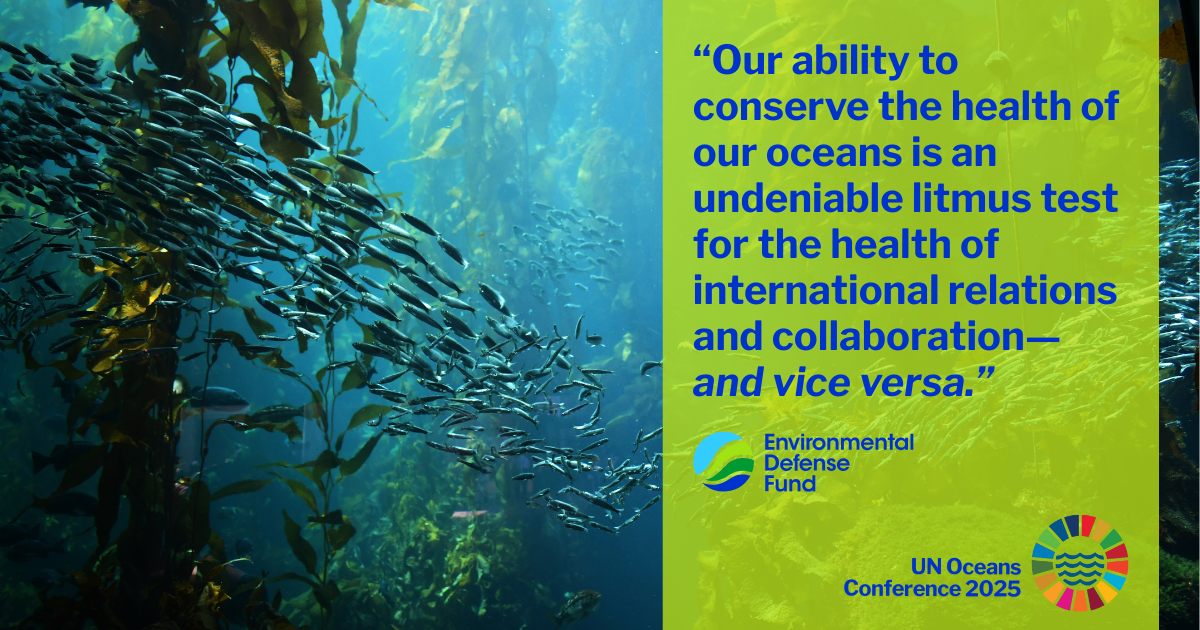Putting people at the center of solutions is crucial to ensure healthy fisheries
 Behind every single seafood dish you have ever eaten is a chain of hands that helped bring that gift from the sea to our plates, often starting with men and women in small-scale fisheries. At Environmental Defense Fund (EDF), we believe that protecting our world’s oceans and coastal livelihoods can only be achieved when we protect people and nature together. In other words, protecting the lives behind all those hands that work in the fisheries and seafood sectors is central to ensuring long-term healthy oceans.
Behind every single seafood dish you have ever eaten is a chain of hands that helped bring that gift from the sea to our plates, often starting with men and women in small-scale fisheries. At Environmental Defense Fund (EDF), we believe that protecting our world’s oceans and coastal livelihoods can only be achieved when we protect people and nature together. In other words, protecting the lives behind all those hands that work in the fisheries and seafood sectors is central to ensuring long-term healthy oceans.
To bring people and social issues to the forefront of our global work in small-scale fisheries, EDF, along with fishers, Mexican partners and experts, recently launched a new report entitled “Social Impact of Small-Scale Fishing in Mexico.” This report analyzes the current socioeconomic situation of coastal communities in Mexico and also reflects the reality of small-scale fisheries around the world. Though small-scale fisheries are critical for food security, the fight against poverty and the sustainable management of fishery resources, most coastal fishing communities live in conditions of marginalization and poverty.
 Fishing communities are vulnerable because they lack access to essential rights and infrastructure. For example, the lack of basic infrastructure and sanitary conditions to handle fish safely and the lack of electricity needed for the operation of cold rooms limits access to markets that can offer better prices. Likewise, the lack of access to social security and health services prevents fishers from affording emergency health care and disease prevention, leading them to acquire debts at extremely high costs with lenders — or even with seafood buyers that ask to be paid back with fish products. This reality incentivizes the race to fish and puts their lives at risk. Securing basic human rights is critical to allow fishers to engage and invest fully in sustainable fisheries management.
Fishing communities are vulnerable because they lack access to essential rights and infrastructure. For example, the lack of basic infrastructure and sanitary conditions to handle fish safely and the lack of electricity needed for the operation of cold rooms limits access to markets that can offer better prices. Likewise, the lack of access to social security and health services prevents fishers from affording emergency health care and disease prevention, leading them to acquire debts at extremely high costs with lenders — or even with seafood buyers that ask to be paid back with fish products. This reality incentivizes the race to fish and puts their lives at risk. Securing basic human rights is critical to allow fishers to engage and invest fully in sustainable fisheries management.
To put people at the center of fishing solutions, EDF and partners provided a series of recommendations for the design of sustainable fisheries policies in small-scale fishing communities. These recommendations include:
1) Socioeconomic policy reforms to strengthen economic capacities at community and regional levels;
2) Sociocultural investments that support the social fabric within these communities;
3) Reforms to strengthen small-scale fishing organizations as key institutions to implement social benefits; and
4) A transversal policy framework that provides focus on the federal government’s multiple, but currently disjointed, efforts to improve the livelihoods of coastal fishers, their families and communities.
 As a result of the report’s presentation and recommendations, top fisheries agency officials at the National Fishing and Aquaculture Commission — or CONAPESCA — are interested in creating a more socially-driven policy agenda. They invited EDF and partners to collaborate and establish transversal fisheries policies through a new multi-sectoral council. Furthermore, CONAPESCA committed to developing indicators to evaluate these transversal policies and their social impacts over time.
As a result of the report’s presentation and recommendations, top fisheries agency officials at the National Fishing and Aquaculture Commission — or CONAPESCA — are interested in creating a more socially-driven policy agenda. They invited EDF and partners to collaborate and establish transversal fisheries policies through a new multi-sectoral council. Furthermore, CONAPESCA committed to developing indicators to evaluate these transversal policies and their social impacts over time.
Putting small-scale fishermen, fisherwomen and their communities at the center of solutions to protect their well-being and adapting to external factors such as global warming and overfishing are instrumental to achieve the Mexican government’s objectives for food security, self-sufficiency and social well-being. Mexico is setting an example that we hope other governments around the world will replicate.
At EDF, we are committed to supporting the processes that will protect and bring visibility to vulnerable fishing communities for whom fishing and the seafood supply chain are main sources of income, and who work responsibly to bring delicious seafood to our plates.












